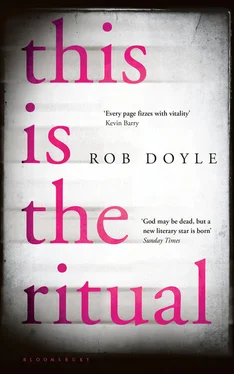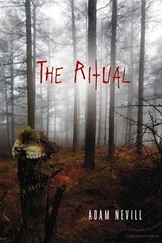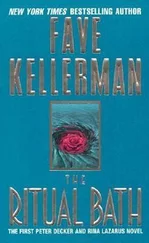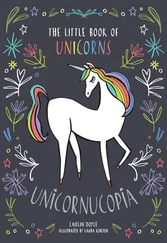Rob Doyle - This is the Ritual
Здесь есть возможность читать онлайн «Rob Doyle - This is the Ritual» весь текст электронной книги совершенно бесплатно (целиком полную версию без сокращений). В некоторых случаях можно слушать аудио, скачать через торрент в формате fb2 и присутствует краткое содержание. Год выпуска: 2016, Издательство: Bloomsbury Publishing, Жанр: Современная проза, на английском языке. Описание произведения, (предисловие) а так же отзывы посетителей доступны на портале библиотеки ЛибКат.
- Название:This is the Ritual
- Автор:
- Издательство:Bloomsbury Publishing
- Жанр:
- Год:2016
- ISBN:нет данных
- Рейтинг книги:5 / 5. Голосов: 1
-
Избранное:Добавить в избранное
- Отзывы:
-
Ваша оценка:
- 100
- 1
- 2
- 3
- 4
- 5
This is the Ritual: краткое содержание, описание и аннотация
Предлагаем к чтению аннотацию, описание, краткое содержание или предисловие (зависит от того, что написал сам автор книги «This is the Ritual»). Если вы не нашли необходимую информацию о книге — напишите в комментариях, мы постараемся отыскать её.
This is the Ritual — читать онлайн бесплатно полную книгу (весь текст) целиком
Ниже представлен текст книги, разбитый по страницам. Система сохранения места последней прочитанной страницы, позволяет с удобством читать онлайн бесплатно книгу «This is the Ritual», без необходимости каждый раз заново искать на чём Вы остановились. Поставьте закладку, и сможете в любой момент перейти на страницу, на которой закончили чтение.
Интервал:
Закладка:
I pressed ‘send’, then got up to make another coffee.
Days passed and I waited for Natasha to reply to my email, or to phone me, but she did neither. I tried calling her Russian number but there was no answer. Days drew out into weeks, time unmarked, indistinguishable time. I spent many hours sitting in the chair, more or less at peace now, contemplating Nietzsche and the study I would one day write of him. The work itself had stalled; I no longer wrote, only reflected, and reread the opening pages of Thus Spoke Zarathustra , which I considered the essential Nietzschean passage. I myself was ‘the last man’; I understood that now. Mostly I read nothing, sitting in my chair in silence, whole days passing. My fears had dispersed. I would write my book on Nietzsche eventually, and even if I didn’t, somehow that was OK too, because I was living the book, encountering Nietzsche in a manner which went beyond literature. I knew I would never make it to Turin. I thought often of the filthy and stinking toilet in the Dublin Mail Centre where I had first read Nietzsche; I wondered if it was still in use, whether some earnest, anguished young man was sitting in there at that very moment, discovering the awe and terror of Nietzsche, of a world which was drifting away from all suns, falling as through an infinite nothing.
Summer ended. I had stopped washing the dishes. It was over a month and a half since Natasha’s last email, and two months since her last phone call. My savings had dwindled and soon I would have to apply for benefits. I no longer read anything at all. One afternoon I opened my laptop and reactivated my Facebook account for the first time in years. I clicked on Natasha’s profile. There, I found a photograph, posted two weeks earlier by someone named Dmitri. The photo was of Natasha, her father and brothers, and several people I did not know, standing in a ballroom at some semi-formal occasion. Everyone in the picture was smiling. Natasha, with an enchanted expression, gazed past the others at this Dmitri, who smiled back at her with a calm, self-assured gaze. Natasha had one hand on her father’s chest, and she was wearing a pair of bright red shoes — brighter and redder than the shoes I had been sleeping with for the past several months. After staring at the photo for some time, I deleted my Facebook account and shut the laptop.
In the bedroom, it seemed to me that Natasha’s old shoes were no longer as shiny as they had once been, and no longer as red. In fact, it seemed that they were not red at all, and perhaps never had been, but magenta, or wine. I now even recalled, or seemed to recall, hearing Natasha referring to them, not once but several times, as her ‘wine-coloured shoes’.
Three Writers
The Glasgow Novels of Malcolm Donnelly
Growing up in a harsh, working-class area of Glasgow, Malcolm Donnelly turned to reading as a means of escape. From his teens onwards, writing served the same purpose. When he was sober, Malcolm’s widowed father, Angus, felt inadequate to the task of single-handedly raising three boys while working long shifts at the Tennent’s brewery. When drunk, he was no less inadequate, but alcohol dulled his frustration.
In his early fiction, Donnelly took flight from these dismal surroundings, preferring exotic settings and fantastical plots. His first three novels were set entirely in countries and regions where Donnelly had never been: Borneo, Panama, the Maghreb. Rather than alcoholics and Glasgow hard men, the novels are populated by shamanic tribes, arms dealers, pirates of the Malacca Strait, warlords and savages. In short, these were the kind of books based not on personal experience, but on other books — and on movies, comics and cartoons.
It was not until Blades or Shadows (1979) that Donnelly adopted his native Glasgow as a fictional setting. The city he depicts is a vision of hell. The dark, polluted streets and piss-sodden alleys bear witness to lives of unremitting bleakness. The pubs where much of the novel’s action takes place (though ‘action’ is a dubious word) are sordid to the point of hallucination. Drinking is constant, joyless and brutal. Sex, when it happens, is cursory and humiliating. Fat, toothless whores grope the cocks and balls of the men who sit drinking lager amid clouds of cigarette smoke. The men listlessly swat the whores away, having scant interest in sex and probably no capacity for it either. A brawny, sullen man who habitually downs three whiskeys for every pint of Foster’s he drinks, swings a punch at a particularly foul whore who attempts to entice him by juggling her enormous tits in his face. The punch knocks her to the floor; the other drinkers watch indifferently before returning to their conversations or their pints.
The novel’s climax is a long, desultory, expletive-ridden dialogue between Sam, a red-headed youth of twenty-two without prospects, interests or aspirations (he is the novel’s protagonist), and a much older man with a drink-ruddy face and a rasping cough, named Phil the Club. The dialogue’s binding theme is human isolation: both agree it cannot be escaped (Sam adds: why would you want to?). A huge woman named Jolene, ‘with layers of chin you could sink a fist in’, briefly joins the conversation. Sam tells her to fuck off. Phil and Sam broach such topics as Scottish independence, page-3 girls, English women, the IRA, Celtic and Rangers, the Queen, the greatest footballers of all time, the greatest footballers of the decade, and infidelity.
At the end of the dialogue, Sam staggers out of the pub to throw up against the wall. Phil the Club (who has drunk as much as Sam, if not more) orders another pint, which he drinks as he has drunk all the others: in three vast gulps. The novel ends with Phil sitting on his stool, gazing into the gloom of the pub. The author compares him to the Buddha.
In Mitchelmore (1985), Glasgow is again the setting. The city is evoked no less pessimistically. This time, a series of horrific murders in Glasgow’s most run-down areas provides the skeleton of plot on which the novel is fleshed out. Jake Mitchelmore is the detective charged with investigating the murders. Initially he pursues his duty with a marked lack of energy or conviction. It is unclear whether he believes the murderer cannot be caught, or if he simply has no desire to do so. Mitchelmore is a lugubrious man, given to ruminating dourly while gazing into the black waters of the Clyde, or at the faces of the Glaswegians who flow past him on the streets, ‘a river of derelict souls, lurching towards Nightmare’.
All of the victims — seven, at the point when Mitchelmore takes on the investigation — are male, between the ages of twenty and fifty-two, and all are football fans. Four are fans of Celtic, two are fans of Rangers, and the other — this is the detail that eventually brings Mitchelmore to the brink of madness — follows Hearts. The men have come to grief on deserted streets or in lanes while returning from the brutal drinking sessions which are the leitmotif of Donnelly’s Glasgow fiction. More often than not, the victims are killed by a single blow to the back of the head, sometimes while pissing against a wall.
Two theories are proposed. First, that two killers are responsible, and Glasgow is playing host to a tit-for-tat series of attacks among football fans gone to the dark side. In this theory, one of the killers is a Celtic fan, while the other follows Rangers. (So why did the Hearts fan have to die? wonders Mitchelmore.) Second, that the murders have been committed by a lone individual — a serial killer, though Donnelly refrains from using the term throughout the novel, for reasons best known to himself.
Mitchelmore soon discounts the first theory — the multiplication of motives is dangerous and inelegant. Despite the opposition of his superiors (and his rivals), Mitchelmore knows in his heart of hearts that the crimes are those of a single, profoundly disturbed individual, probably an alienated young man from the inner city whose parents were alcoholics or abusers — a young man, in fact, not unlike Mitchelmore in his youth, before he found his direction in life through a career in the force and a passion for training pigeons.
Читать дальшеИнтервал:
Закладка:
Похожие книги на «This is the Ritual»
Представляем Вашему вниманию похожие книги на «This is the Ritual» списком для выбора. Мы отобрали схожую по названию и смыслу литературу в надежде предоставить читателям больше вариантов отыскать новые, интересные, ещё непрочитанные произведения.
Обсуждение, отзывы о книге «This is the Ritual» и просто собственные мнения читателей. Оставьте ваши комментарии, напишите, что Вы думаете о произведении, его смысле или главных героях. Укажите что конкретно понравилось, а что нет, и почему Вы так считаете.












